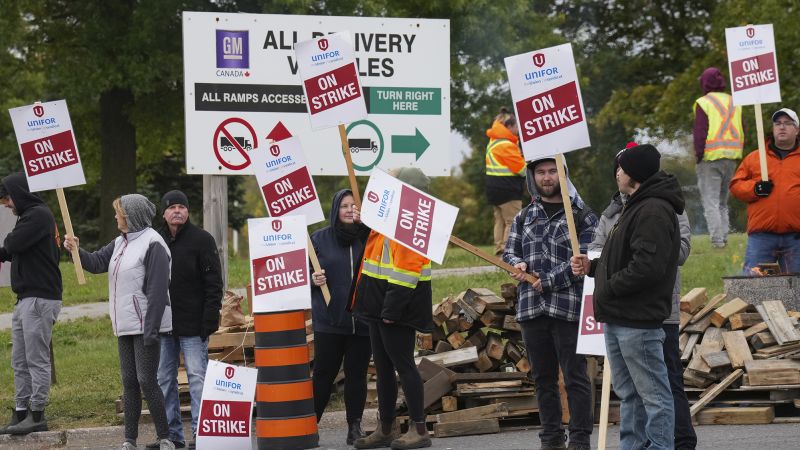A strike at General Motors’ Canadian plants is over less than a day after it started, according Unifor, the union that represents more than 4,000 autoworkers at the company.
The strike had begun 11:59 pm Monday when Unifor said GM had refused to agree to a deal similar to the one the union previously reached with Ford. That kind of deal is known as a pattern agreement.
The union said the company quickly gave in to union demands once the strike started.
“When faced with the shutdown of these key facilities General Motors had no choice but to get serious at the table and agree to the pattern,” said Unifor National President Lana Payne. “The solidarity of our members has led to a comprehensive tentative agreement that follows the pattern set at Ford to the letter.”
The union said strike actions are on hold to allow the membership to vote on the tentative agreement. The strike could resume if the rank-and-file members fail to ratify the deal.
But it’s uncertain whether it will win approval of membership. Only 54% of Unifor members at Ford voted in favor of the deal.
The Unifor strike occurred while GM as well as rivals Ford and Stellantis were already dealing with strikes by the United Auto Workers union. That strike had started September 15 against targeted facilities of each company. More than 25,000 UAW members are now on strike at the three companies, with nearly 10,000 of those at GM.
“This record agreement, subject to member ratification, recognizes the many contributions of our represented team members with significant increases in wages, benefits and job security while building on GM’s historic investments in Canadian manufacturing,” said GM’s statement.
The Unifor strike had shut its assembly plant in Oshawa, Ontario, which builds the Silverado pickup truck, GM’s best-selling model. It also had the potential to cause widespread shutdowns and production cuts at GM plants across the United States. One of the Canadian plants on strike, in St. Catharines, Ontario, builds transmissions as well as V-8 and 6-cylinder engines used in many of GM’s most popular, and most profitable, models.
Among the US plants at risk of shutting or slowing production without St. Catharines at full operations were are factories in Arlington, Texas; Fort Wayne, Indiana; Bowling Green, Kentucky; as well as Lansing Grand River in Michigan and San Luis Potosi, Mexico. Models built in those plants include the Silverado and GMC Sierra pickups; plus full-size SUVs such as the Chevy Tahoe, GMC Yukon and Cadillac Escalade, as well as the Chevy Equinox and Traverse SUVs.
This is the second time in less than a week that GM apparently gave into a union’s threat to shut down production of the large SUV factory in Arlington, Texas.
On Friday, just as the UAW was about to announce an expansion of its strike to Arlington, the company gave in on a key union demand revolving around employees at a current and future EV battery plant being covered by the union’s national master labor agreement, according to a update given to UAW members on Friday by UAW President Shawn Fain.
Fain described the Arlington plant “GM’s biggest money maker” in his remarks to membership.
“It was that threat [of expanding the strike to Arlington] that brought GM to the table,” he said.
Improved pay and pensions
Details of the Unifor deal were not immediately available. But the deal with Ford included a wage increase of 10% in the first year of the agreement, followed by a 2% and 3% increase over the next two years of the contract. It also restored the cost-of-living adjustments (COLA) to protect workers from rising prices.
The Ford agreement also returned to a pension plan — rather than just 401(k)-style retirement accounts — for Unifor members hired at Ford in recent years. And it converted temporary staff who work full-time shifts into permanent employees.
Autoworkers in both Canada and the United States used to all have COLA clauses in their contracts as well as traditional pension plans that pay retirees a set amount every month as long as they live. But the automakers got unions on both sides of the border to give up the COLA for all members and traditional pensions for new hires when the companies were in financial distress in 2007 through 2009.
Restoring those concessions have been a major negotiation demand of both Unifor and the UAW.
Read the full article here










